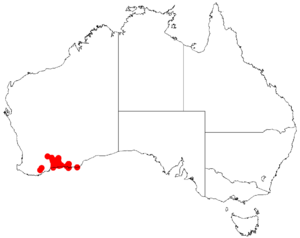Acacia pinguiculosa facts for kids
Quick facts for kids Acacia pinguiculosa |
|
|---|---|
| Scientific classification | |
| Genus: |
Acacia
|
| Species: |
pinguiculosa
|
 |
|
| Occurrence data from AVH | |
Acacia pinguiculosa is a type of shrub that belongs to the Acacia family. It is a special plant because it only grows in a specific part of southwestern Australia. This means it is endemic to that area.
What it Looks Like
This shrub usually grows to be about 0.3 to 1.5 metres (1 to 5 ft) tall. It is a bushy plant with many branches, often forming a rounded shape. Its small branches are usually smooth (this is called glabrous), but sometimes they can be a bit hairy.
Like most Acacia plants, Acacia pinguiculosa has special leaf-like structures called phyllodes instead of true leaves. These phyllodes are smooth and stay green all year round. They grow upwards and can be straight or slightly curved. They look like thin lines or have a wider, spoon-like shape.
These smooth, slightly thick phyllodes are about 10 to 30 mm (0.39 to 1.18 in) long and 1 to 7.5 mm (0.039 to 0.295 in) wide. They have a few veins on their surface. The plant blooms from August to October, showing off white-yellow flowers.
Plant Families
Scientists group living things into categories. This helps us understand how they are related. Acacia pinguiculosa has two main types, called subspecies. These are like different versions of the same plant.
- Acacia pinguiculosa subsp. pinguiculosa
- Acacia pinguiculosa subsp. teretifolia
Where it Grows
This shrub grows naturally in the Great Southern and Goldfields-Esperance areas of Western Australia. You can often find it on granite hills and rocky areas. It also grows on rises, low ranges, and flat plains.
It prefers certain types of soil, like loam, clay, or sandy soils. These soils are often found over or near granite or laterite rock. The plant's range stretches from around Frank Hann National Park in the northwest to Ravensthorpe in the south. It also reaches near Cape Le Grand National Park and Mount Burdett in the east. Here, it usually grows as part of low scrub, shrub mallee, or heathland plant groups.

